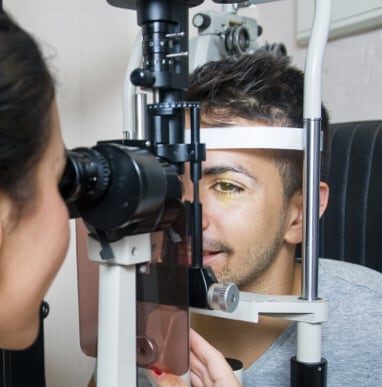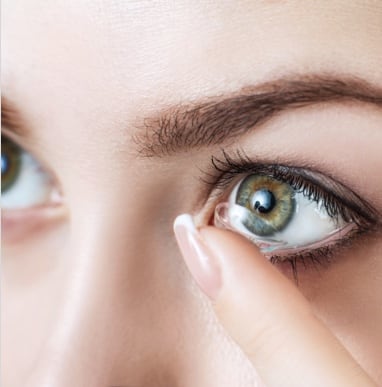Dry eye can be a persistent source of discomfort, making your eyes feel scratchy, tired, or irritated. Your tears are more than just water; they’re a complex mixture that keeps your eyes lubricated and your vision clear. When this delicate balance is off, you feel the effects.
Fortunately, you can take steps to support your eye health through your diet. A balanced diet rich in specific vitamins and nutrients like vitamins A, C, D, E, B12, and omega-3 fatty acids can play a part in healthier eyes and tear film. While nutrition is a great start, professional dry eye therapy services can offer more targeted relief. As your eye doctor, we can help you explore all of the best foods for dry eye and create a plan that works for you.
What Is Dry Eye and What Causes It?
Dry eye occurs when your eyes don’t produce enough tears or when the tears you do produce evaporate too quickly. According to the National Eye Institute, this is a common and often chronic problem. Your tear film has 3 layers: oil, water, and mucus, which work together. A problem with any of these layers can lead to different types of dry eye and discomfort.
Common Causes of Dryness
Several factors can disrupt your tear production and lead to dry eye. Each one affects your eyes in a unique way, from environmental triggers to personal health. Common causes of dry eye can include:
- Aging
- Certain medications
- Medical conditions like Sjögren’s syndrome or thyroid disorders
- Dry air, wind, or smoke
- Hormonal changes in life
- Prolonged use of contact lenses
- Previous eye procedures
Recognize the Signs and Symptoms of Dry Eye
It’s helpful to know the signs of dry eye so you can address them early. The symptoms can range from mild annoyance to significant discomfort that impacts your vision. Pay attention to how your eyes feel throughout the day.
What to Look For
You may be experiencing dry eye if you notice any of the following symptoms. It’s common to have more than one at a time:
- A scratchy, burning, or gritty feeling
- Redness and irritation
- Watery eyes, which are the body’s response to irritation
- Sensitivity to light
- Blurry vision that comes and goes
- A feeling that something is in your eye
- Eye strain or headaches

Key Vitamins for Eye Health and Comfort
Nutrition is a powerful tool for maintaining healthy eyes and comfortable vision. Certain vitamins contribute directly to tear quality, help reduce inflammation, and support the delicate structures of your eyes. Let’s look at some of the most important ones.
Vitamin A and C
Vitamin A is important for the health of the cornea, the clear outer surface of your eye. It helps protect this surface and supports clear vision. A lack of this vitamin can contribute to significant dryness.
As a powerful antioxidant, vitamin C helps support the health of blood vessels in your eyes. This contributes to overall eye function and can help protect against damage.
Vitamin D and E
Vitamin D can help reduce inflammation on the surface of the eye. It is also connected to improved tear production. Getting enough vitamin D is a simple way to support your eyes’ natural moisture.
Vitamin E is another antioxidant that helps protect the cells in your eyes from damage caused by free radicals. This protection is part of maintaining long-term eye health.
Vitamin B12
Some studies have linked a vitamin B12 deficiency to dry eye symptoms and nerve discomfort. Including this vitamin in your diet can help soothe burning sensations associated with dry eye.
Foods and Supplements for Dry Eye Relief
While supplements are an option, getting nutrients from whole foods is a great approach. Many common and delicious foods are packed with the vitamins your eyes need. Integrating them into your meals is a natural way to boost your eye health.
Eat for Your Eyes
You can find these eye-healthy vitamins in a wide variety of foods. Try adding some of these to your next grocery list:
- Vitamin A: Carrots, sweet potatoes, spinach, and eggs
- Vitamin C: Oranges, strawberries, bell peppers, and broccoli
- Vitamin D: Fatty fish like salmon, fortified milk, and cereals
- Vitamin E: Almonds, sunflower seeds, and avocados
- Vitamin B12: Meat, fish, eggs, and dairy products
Other Helpful Nutrients
Beyond the main vitamins, other nutrients can also help you find relief. Omega-3 fatty acids, found in fish oil and flaxseed, are known to improve the oil layer of the tear film. This helps prevent your tears from evaporating too quickly, and you can learn more about flaxseed versus fish oil options.
Lutein and zinc are two more nutrients that support overall eye function. They help protect your eyes and contribute to stable tear production.
How Your Eye Doctor Can Help with Dry Eye
Improving your diet is a fantastic step, but it’s just one piece of the puzzle. Working with a professional can give you access to a broader range of options for lasting comfort. We can help you create a comprehensive eye care plan.
Personalized Treatment Options
Every person’s eyes are different, so your plan should be too. We may recommend options like medicated eye drops, punctal plugs, or innovative in-office treatments. The goal is always to improve your tear quality and reduce discomfort.
Your Partner in Dry Eye Relief
Managing dry eye effectively starts with a conversation and a thorough examination. Combining a nutrient-rich diet with a personalized treatment plan can lead to lasting relief. As your eye doctor, we are here to help you explore every option.At Vision Care Center, we truly care about every person who walks through our doors. If you’re struggling with dry, uncomfortable eyes, we’re ready to help you find relief. Schedule a consultation with our team today to start your journey toward more comfortable vision.












